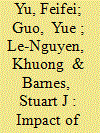| Srl | Item |
| 1 |
ID:
177467


|
|
|
|
|
| Summary/Abstract |
Feed-in tariff (FIT) is a broadly used policy instrument around the world, in which the payment level is always designed to decline gradually in order to track and encourage technological improvement in renewable energy. However, the potential adverse effects of tariff degression on renewable energy research and development (R&D) investment have not been sufficiently addressed. In this paper, we explore the impact of FIT payment degression on renewable energy R&D investment and analyze the efficient FIT payment structure for R&D investment. We form a modeling framework that captures the dynamics of FIT payment levels and the inventor's strategic reactions to tariff changes. In this framework, we model the inventor's optimal R&D investment decisions based on the canonical real option approach and simulate the impact of FIT payment degression on R&D investment and the efficient FIT payment structure under different R&D characteristics using the case of the solar photovoltaic (PV) industry. Our results emphasize the adverse effect of tariff degression on the commercial value of new renewable technology and hence the inventor's incentive in R&D investment, especially when facing more technical uncertainty and financial constraints. Our model could help policymakers to design an efficient FIT payment structure through which the cost of the FIT program is restricted to a minimum level but without influencing the inventor's R&D investment decisions.
|
|
|
|
|
|
|
|
|
|
|
|
|
|
|
|
| 2 |
ID:
150766


|
|
|
|
|
| Summary/Abstract |
In this research, we aim to understand the influence of government subsidies on enterprises’ research and development (R&D) investment behavior, particularly in China’s renewable energy sector. We are also interested in examining how the attributes of enterprise ownership act as a moderating variable for the relationship between government subsidies and R&D investment behavior. Three classical panel data analysis models including the pooled ordinary least squares (OLS) model, the fixed effect model and the random effect model are employed. We find that government subsidies have a significant crowding out influence on enterprises’ R&D investment behavior and that the influence is further moderated by the attributes of enterprise ownership. Moreover, a panel threshold regression model is used to demonstrate how the influence of government subsidies on enterprises’ R&D investment behavior will change when government subsidies increase. Two thresholds, 0.6% and 10.1%, are identified. We recommend that relevant government departments should motivate enterprise R&D investment behavioral intention by increasing subsidies within a certain range. Different attributes of enterprise ownership should also be considered as part of policy reform and re-structuring relating to government subsidies.
|
|
|
|
|
|
|
|
|
|
|
|
|
|
|
|
| 3 |
ID:
144853


|
|
|
|
|
| Summary/Abstract |
A current concern for China's long-term growth prospect is whether China can become an innovative economy and achieve industrial upgrading to compensate for the gradually declining competitiveness resulting from low-cost labor. The present study examines this issue by exploring how trade participation impacts on the R&D investment of manufacturing firms through various channels. Merging China's Annual Manufacturing Survey Dataset and the Chinese Customs Dataset allows us to study such a relationship at the individual firm level. The empirical results suggest that channels such as geographical diversification of export markets, share of imports from high-income countries, average unit value of imports, number of intermediate goods and capital goods imports, and the trade regime are significant factors that influence firm-level R&D investment. The study discusses the policy implications of the empirical findings in relation to industrial and trade policies that may be potentially beneficial for China's transition towards an innovative economy.
|
|
|
|
|
|
|
|
|
|
|
|
|
|
|
|
| 4 |
ID:
133269


|
|
|
|
|
| Publication |
2014.
|
| Summary/Abstract |
This study adds to the understanding of China's innovation prospects by examining how variations in institutional quality within China impact on the R&D efforts of firms located in different provincial regions. In the process of identifying the effect of institutional quality, the roles of other factors such as ownership types and market structures are revealed, which provides interesting insight into firms' R&D behavior. The key findings suggest that institutional quality positively affects the decision of firms to engage in R&D activities. Once firms start to engage in R&D, the subsequent expansion of firm-level R&D intensity depends on factors such as market structure. Therefore, strengthening domestic institutional quality is the first critical step towards the goal of building a knowledge-intensive economy in China. Efforts to nurture market development are also important for achieving this goal.
|
|
|
|
|
|
|
|
|
|
|
|
|
|
|
|